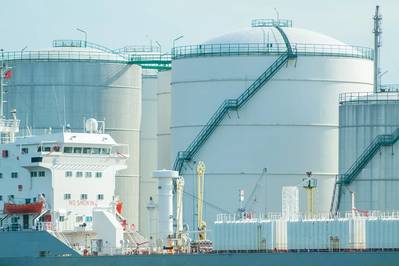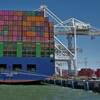Insolvency at European Storage Terminal Supports Tank Storage Rates
The insolvency of a major storage terminal planned in northwest Europe has supported regional tank storage rates for diesel and gasoline, just as European traders rush to fill up diesel tanks ahead of a Feb. 5 ban on Russian fuel.
Earlier this month, the district court in Rotterdam declared the insolvency of the long-delayed HES Hartel Tank Terminal, to be developed in Europe's major trading port of Rotterdam.
The terminal would have offered 1.3 million cubic metres of storage capacity for gasoline, diesel, gasoil, jet fuel and biofuels.
Oil major BP — operator of the 400,000 barrel per day (bpd) Rotterdam refinery — had planned to connect to the new terminal by pipeline, which was expected to reduce BP's demand for storage facilities elsewhere.
The firm is now looking for spare capacity elsewhere in northwest Europe, which is helping to drive up tanker rates, an industry source told Reuters on condition of anonymity.
BP declined to comment.
Diesel and gasoline tank storage rates in Europe's Amsterdam-Rotterdam-Antwerp (ARA) storage region have risen by 10% this quarter compared with October-December, according to preliminary data from Dutch consultancy Insights Global's tank storage rate report.
This coincides with European traders rushing to fill tanks with Russian diesel ahead of a Feb. 5 European ban expected to tighten supplies, redraw global shipping routes and increase price volatility.
Gasoil stocks held in independent storage in the ARA region rose to their highest on Thursday since early September 2021, Insights Global data showed.
"There is still a bit of [diesel storage] capacity available," said Krien van Beek, a broker at ODIN-RVB Tank Storage Solutions in Rotterdam, adding that steep backwardation last year in gasoil futures led to high throughput levels.
Backwardation means that prompt prices are higher than future contract prices, reflecting near-term demand that encourages traders to release oil from storage to sell it.
Originally planned to be operational from 2019, the HES Hartel tank terminal project ran into financial difficulties. A number of setbacks, including the COVID-19 pandemic and a fire at the terminal, caused delays and additional costs, according to HES International.
"Unfortunately, it is no longer financially viable for HES International to invest the further significant amounts required to complete the HES Hartel Tank Terminal given the level of project finance indebtedness at the terminal level," according to HES.
Discussions in recent months with project finance banks and the "expected customer" to find a solution to allow construction to be completed to not lead to a solution, HES said.
(Reuters - Reporting by Rowena EdwardsEditing by Tomasz Janowski)














